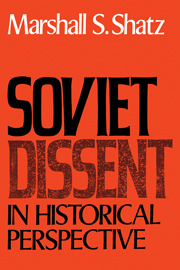Book contents
- Frontmatter
- Contents
- Preface
- 1 Introduction
- 2 The genesis of the Russian intelligentsia
- 3 The formation of a Russian intelligent
- 4 Reason and revolution
- 5 Khrushchev and the de-Stalinization campaign: the development of literary dissent
- 6 The Siniavsky–Daniel trial and its aftermath: legal tactics and organizational efforts
- 7 The Soviet dissidents
- 8 Programs and prospects
- Notes
- Select bibliography
- Index
4 - Reason and revolution
Published online by Cambridge University Press: 04 August 2010
- Frontmatter
- Contents
- Preface
- 1 Introduction
- 2 The genesis of the Russian intelligentsia
- 3 The formation of a Russian intelligent
- 4 Reason and revolution
- 5 Khrushchev and the de-Stalinization campaign: the development of literary dissent
- 6 The Siniavsky–Daniel trial and its aftermath: legal tactics and organizational efforts
- 7 The Soviet dissidents
- 8 Programs and prospects
- Notes
- Select bibliography
- Index
Summary
Often I found that a human and sympathetic Communist was a bad Communist to the extent that he was human and sympathetic, and that he was well aware of this himself.
Stephen Spender, The God That Failed.If the ultimate objective of the Russian intelligentsia's dissent was to liberate the individual from arbitrary authority, something clearly went wrong. The tsarist order toppled, but this long-sought political change, instead of removing the obstacles to the individual's development, opened the way to the new and far more repressive system of Stalinism. Obviously, the new Soviet order was the product of complex historical, cultural, and material circumstances. But contradictions within the intelligentsia's own thinking contributed to the rise of Stalinism, or at least rendered the intelligentsia itself unable to resist it – as many intelligenty themselves realized only too late. From the very beginning of its history, one of the major concerns of the intelligentsia, a group whose very identity rested on its educated consciousness, was the role of reason in human affairs. The evolution of the intelligentsia's attitude toward reason and the relationship of reason to individual freedom provides one of the keys to its decline and fall at the hands of Stalin.
From the outset of its struggle for personal liberation, the Russian intelligentsia regarded reason as its chief weapon. Again, it was the state, intent on creating a modern educated class, that first implanted this notion.
- Type
- Chapter
- Information
- Soviet Dissent in Historical Perspective , pp. 64 - 92Publisher: Cambridge University PressPrint publication year: 1981



